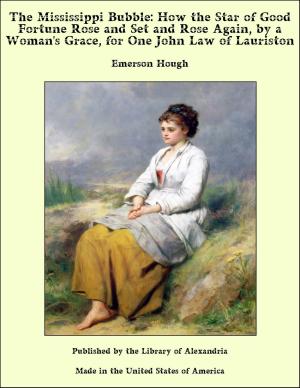Carolina Chansons: Legends of the Low Country
Nonfiction, Religion & Spirituality, New Age, History, Fiction & Literature| Author: | DuBose Heyward | ISBN: | 9781465551498 |
| Publisher: | Library of Alexandria | Publication: | July 29, 2009 |
| Imprint: | Library of Alexandria | Language: | English |
| Author: | DuBose Heyward |
| ISBN: | 9781465551498 |
| Publisher: | Library of Alexandria |
| Publication: | July 29, 2009 |
| Imprint: | Library of Alexandria |
| Language: | English |
In a continent but recently settled, many parts of which have as yet little historical or cultural background, the material for this volume has been gathered from a section that was one of the first to be colonized. Here the Frenchman, Spaniard, and Englishman all passed, leaving each his legend; and a brilliant and more or less feudal civilization with its aristocracy and slaves has departed with the economic system upon which it rested. From this medley of early colonial discovery and romance, from the memories of war and reconstruction, it has been as difficult to choose coherently as to maintain restraint in selection among the many grotesque negro legends and superstitions so rich in imagery and music. Coupled with this there has been another task; that of keeping these legends and stories in their natural matrix, the semi-tropical landscape of the Low Country, which somehow lends them all a pensively melancholy yet fitting background. Not to have so portrayed them, would have been to sacrifice their essentially local tang. To the reader unfamiliar with coastal Carolina, the unique aspects of its landscapes may seem exaggerated in these pages; the observant visitor and the native will, it is hoped, recognize that neither the colors nor the shadows are too strong. These poems, however, are not local only, they are stories and pictures of a chapter of American history little known, but dramatic and colorful, and in the relation of an important part to the whole they may carry a decided interest to the country at large. Local color has a fatal tendency to remain local; but it is also true that the universal often borders on the void. It has been said, perhaps wisely, that the immediate future of American Poetry lies rather in the intimate feeling of local poets who can interpret their own sections to the rest of the country as Robinson and Frost have done so nobly for New England, rather than in the effort to yawp universally. Hence there is no attempt here to say, "O New York, O Pennsylvania," but simply, "O Carolina." The South, however, has been "interpreted" so often, either with condescending pity or nauseous sentimentality, that it is the aim of this book to speak simply and carefully amid a babel of unauthentic utterance. Nevertheless, the contents of this volume do not pretend to exact historical accuracy; this is poetry rather than history, although the legends and facts upon which it rests have been gathered with much painstaking research and careful verification. It should be kept in mind that these poems are impressionistic attempts to present the fleeting feeling of the moment, landscape moods, and the ephemeral attitudes of the past. Legends are material to be moulded, and not facts to be recorded. Above all here is no pretence of propaganda
In a continent but recently settled, many parts of which have as yet little historical or cultural background, the material for this volume has been gathered from a section that was one of the first to be colonized. Here the Frenchman, Spaniard, and Englishman all passed, leaving each his legend; and a brilliant and more or less feudal civilization with its aristocracy and slaves has departed with the economic system upon which it rested. From this medley of early colonial discovery and romance, from the memories of war and reconstruction, it has been as difficult to choose coherently as to maintain restraint in selection among the many grotesque negro legends and superstitions so rich in imagery and music. Coupled with this there has been another task; that of keeping these legends and stories in their natural matrix, the semi-tropical landscape of the Low Country, which somehow lends them all a pensively melancholy yet fitting background. Not to have so portrayed them, would have been to sacrifice their essentially local tang. To the reader unfamiliar with coastal Carolina, the unique aspects of its landscapes may seem exaggerated in these pages; the observant visitor and the native will, it is hoped, recognize that neither the colors nor the shadows are too strong. These poems, however, are not local only, they are stories and pictures of a chapter of American history little known, but dramatic and colorful, and in the relation of an important part to the whole they may carry a decided interest to the country at large. Local color has a fatal tendency to remain local; but it is also true that the universal often borders on the void. It has been said, perhaps wisely, that the immediate future of American Poetry lies rather in the intimate feeling of local poets who can interpret their own sections to the rest of the country as Robinson and Frost have done so nobly for New England, rather than in the effort to yawp universally. Hence there is no attempt here to say, "O New York, O Pennsylvania," but simply, "O Carolina." The South, however, has been "interpreted" so often, either with condescending pity or nauseous sentimentality, that it is the aim of this book to speak simply and carefully amid a babel of unauthentic utterance. Nevertheless, the contents of this volume do not pretend to exact historical accuracy; this is poetry rather than history, although the legends and facts upon which it rests have been gathered with much painstaking research and careful verification. It should be kept in mind that these poems are impressionistic attempts to present the fleeting feeling of the moment, landscape moods, and the ephemeral attitudes of the past. Legends are material to be moulded, and not facts to be recorded. Above all here is no pretence of propaganda















